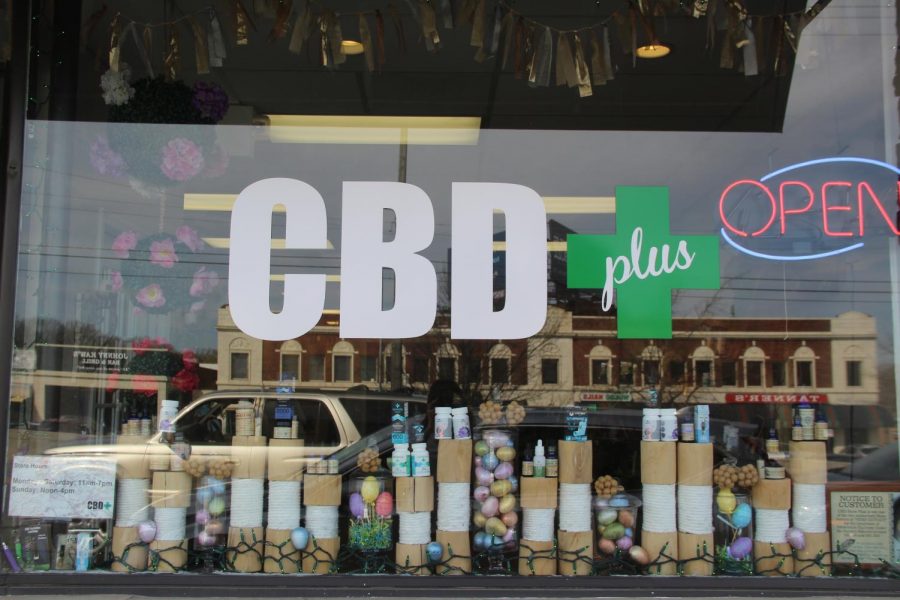CBD: revolutionizing remedies
Cannabidiol, known as CBD, has popularized as an alternative to pharmaceutical treatment for pain, anxiety and depression. The possibilities of the industry grow with the substance’s widespread success in Kansas City and beyond.
Various products and Easter decorations line the window of CBD+ April 6. CBD can be used for such issues as pain, inflammation, anxiety and depression. photo by Mary Massman.
May 1, 2019
For years, CBD Plus owner Lea Henry struggled with anxiety and depression, finding little to no relief from pharmaceuticals. She searched for a remedy until she stumbled upon an all-natural solution that would later allow her to stop using the medications entirely: CBD.
Cannabidiol, known as CBD, has popularized as a legal, relaxative compound used to provide temporary pain, anxiety and depression relief. The substance can be internalized through oils, tinctures, edible mediums, capsules or vaping or absorbed topically through a cream or lotion according to Health Line. Triggering the endocannabinoid system which helps to regulate movements and feelings, Henry explains that CBD supplements aid a preexisting bodily system.
“You have an endocannabinoid system yourself, anything with a spine does: cats, dogs, humans,” Henry said. “That’s why [CBD] almost takes you back to your homeostasis.”
Henry started her business to share the anxiety relief she saw from CBD with others in Kansas City. Her products are primarily derived from hemp rather than marijuana with higher Tetrahydrocannabinol, known as THC, levels as commonly misconceived. While THC creates a psychoactive reaction shortly after ingestion, CBD does not decrease cognitive awareness according to Medical News Today.
“People think you will become high off of it because most of our products — I would say 80% of our products — do have trace amounts of THC, less than 1% and 3% is the legal amount you can have in Missouri,” Henry said. “But, they’re not [going to] because it’s just a very little amount. It helps boost the CBD to act in your body better when you don’t extract cannabinoids out which is why they use the hemp plant instead of marijuana.”
Internalized CBD can provide general relaxation among other effects while topicals relieve pain in areas where the cream or lotion is applied. Henry recommends certain products to her customers based on their personal needs.
“When you take [CBD] internally, it’s everywhere in your body versus topical which only helps where you put it on,” Henry said. “Topical takes about 15 to 20 minutes to penetrate through the layers of your skin and usually always lasts about three to four hours. An Internal like the tincture or oil is under the tongue and also lasts about three to four hours depending on the individual. And then there’s stuff you can mix with drinks and the capsules,”
Sophomore Madeline Gentry has used a CBD Oil Tincture to boost her energy levels since the fall, subsequently enhancing her academic and athletic performance. According to Medium, CBD can improve cognitive abilities such as focus as it creates a “balanced sleep-wake cycle” by combating nighttime restlessness.
“It helps me focus throughout the day since I’m really active and play a lot of sports,” Gentry said. “I used to get really tired throughout the day and almost fall asleep during class, but now I feel like I have the energy to get through.”
Gentry believes the stigma behind CBD is primarily derived from the close connection between CBD and THC.
“People always think that it is marijuana,” Gentry said. “Even my sister thought it was going to make her high, so she wouldn’t take it.”
Junior Phoebe Burke also uses a CBD Oil Tincture and finds it to relieve anxiety in stressful times. She agrees that a harmful misconception about CBD is that it is an illegal drug.
“There is nothing psychedelic to it,” Burke said. “It’s nothing illegal — it’s purely natural and there’s not a reason for it not to be used.”
Burke believes another obstacle facing CBD is widespread doubt of its efficiency due to a 2017 study review conducted by the National Academies of Sciences, Engineering and Medicine. The study could not determine whether CBD works effectively in treating anxiety at the time due to a sheer lack of clinical trials with hemp and marijuana plants. Gentry chooses to rely on personal experience when determining CBD’s efficacy.
“It’s something that I’m taking just for the benefits that it will give me, I’m not expecting to get something out of it,” Gentry said.
However, Henry attributes perceived ineffectiveness to an outright misdosage.
“A lot of times when you take something and it doesn’t work, you might need a higher milligram,” Henry said.
Despite misconceptions and doubts alike, Henry feels the CBD industry will grow significantly in the near future, particularly in its incorporation into nationwide businesses.
“In Colorado, Walgreens and CVS will start carrying CBD,” Henry said. “A lot of companies are doing it in states where medical and recreational marijuana is already [legal].”
Henry believes further proof of the business’ endless possibilities lies in growing CBD product production for animals. Currently, she sells a full CBD pet line at her store.
“They use it for the exact same reasons humans do,” Henry said. “You could do the water soluble where they drink it throughout the day so it stays with them if they’re in pain, or you could do an oil just before they leave the house if they have separation anxiety.”
Whether for pets or people, Henry feels CBD is a substance that can and will continue to transform the medicinal industry.
“I feel like it has just hit the surface and there is still opportunity to grow,” Henry said.




